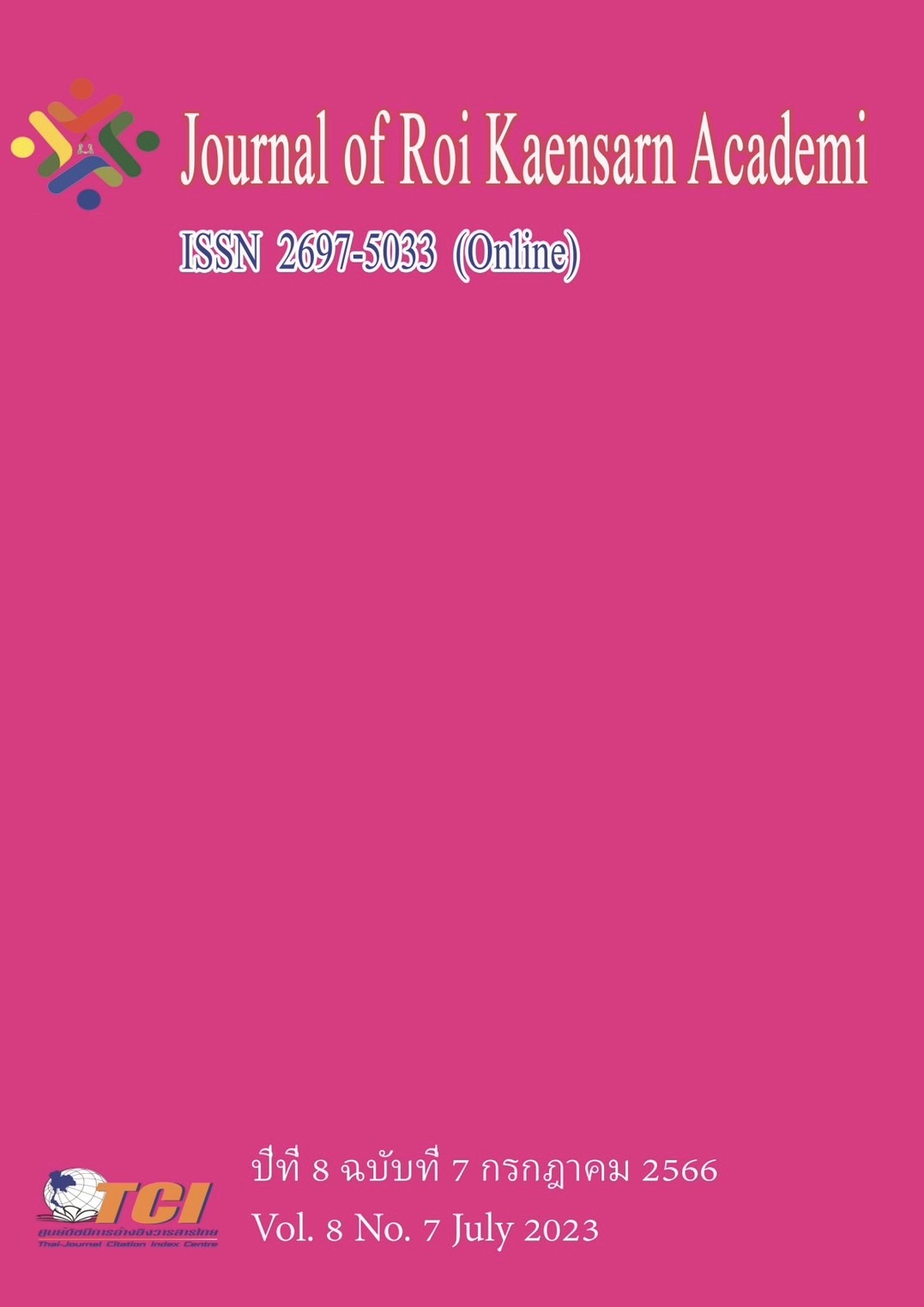The Learning Management Through theStudent Team Achievement DivisionCombined withMind Mapping Techniques to Develop Learning Achievement For 1st Year of Secondary Vocational Students
Main Article Content
บทคัดย่อ
The objectives of this research were to: 1) compare the pre-and post-learning achievement of 1st-year secondary vocational studentsstudying through the traditional approach, 2) compare the pre-and post-learning achievement of the students studying through the Student Team Achievement Division combined with Mind Mapping techniques, and 3) compare the postlearning achievement of students studying through the traditional approach and the learning management through the Student Team Achievement Division combined with Mind Mapping techniques. The research sample was 40, selected by cluster random sampling, 1st year of tourism major students at the secondary vocational school, Beijing, China in the academic year 2022. The research instruments consisted of 1) a learning management plan based on the traditional approach, 2) a learning management plan based on Student Team Achievement Division combined with Mind Mapping techniques, and 3) a learning achievement test. The statistics used for data analysis were mean, standard deviations, independent samples t-test, and dependent samples t-test.The research results showed that: 1) the post-learning achievement of 1st-year secondary vocational studentsstudying through the traditional approach was higher than the pre-learning at a statistical significance level of .05., 2) the post-learning achievement of students studying throughthe Student Team Achievement Division combined with Mind Mapping techniques was higher than the pre-learning at a statistical significance level of .05., and 3) the students learning achievement of those studying throughthe Student Team Achievement Division combined with Mind Mapping techniques was higher than those studying through the traditional approach at a statistical significance level of .05.
Article Details
เอกสารอ้างอิง
Bai, S. (2016). Application of mind map in college computer public course. Journal of Jilin University of Chemical Technology. 33 (10), 74-78.
Chen, D. (2018). Curriculum reform of tour guides basic knowledge based on application-oriented tourism talent training. Journal of LiaoNing University of Science and Technology. 20 (06), 84-86.
Crocker, L. and Algina, J. (1986). Introduction to classical and modern test theory. New York: Holt, Rinehart, and Winston.
Fran, S. M. and Purwati O. (2014). The Implementation of Student Team Achievement Division (STAD) in Teaching Reading of Recount Text for the Eighth Grade of SMPN 1 Sukomoro. Retain.
Gustiawan, D. and Bisri, H. (2018). The Effect of Cooperative Learning Student Team Achievement Division (STAD) Model on Student Learning Outcomes of Grade V of Elementary School of Sukajaya. (1), 374-386.
Hong, B. Q. (2021). Research on the effective application of theSTAD cooperative learning model in high school ideological and political teaching. Gansu Education Research, (04), 54-58.
Indah, C. E., Pidarta, M., and Prasetyo, K. (2018). Cooperative Learning Mode of Students Team Achievement Division (STAD) with Mind Mapping Technique to Increase 4th Grade Students Learning Result. Proceedings of the 2nd International Conference on Education Innovation (ICEI 2018).
Jamaludin, M., and Mokhtar, M. F. (2018). Students Team Achievement Division. International Journal of Academic Research in Business and Social Sciences. (8), 1251-1267.
Jenkins, A. (2009). Mind Mapping. Nursing standard: official newspaper of the Royal College of Nursing. 20 (7), 85.
Ji Y. L. (2020). Practice and application of mind mapping in undergraduate course teaching: Taking Microbiology course as an example. Microbiology Bulletin. 47 (12), 4300-4308.
Johnson, D. and Stanne M. (2000). Cooperative learning methods: A meta-analysis. Education Technology. 19 (08), 455-468.
Johnson, J. (2009). An Educational Psychology Success Story: Social Interdependence Theory and Cooperative Learning. Educational Researcher. 38 (5), 365-379.
Linxin, L. and Jianjun G. (2019). "Five Steps" to Do a good job in the top-level design of ideological and Political Courses: A Case Study of Basic Knowledge of National Tour Guides. Education modernization. 6 (61), 245-247.
Margulies, N. (2002). Mapping Inner Space: Learning and Teaching Mind Mapping. Journal of Secondary Educational Technology. 29 (51), 122-134.
Pan, Q. (2021). Study on the teaching reform of Basic Knowledge of Local Tour Guides based on the integration of "course, certificate and post". Journal of JilinEngineering and Technology, Normal University. 37 (06), 48-50.
Purba I. (2018). Improving Fourth Grade Natural Science Learning Outcomeswith Type Student Team Achievement Division (STAD) Cooperative Model. PrimaryEdu - Journal of Primary Education. 2 (2), 102-111.
Ying, Q. (2021). Current Situation and Implementation Strategy of Basic Knowledge Course of Tour Guides. Journal of Hebei North University (Social Science Edition). 38 (02), 86-89.

